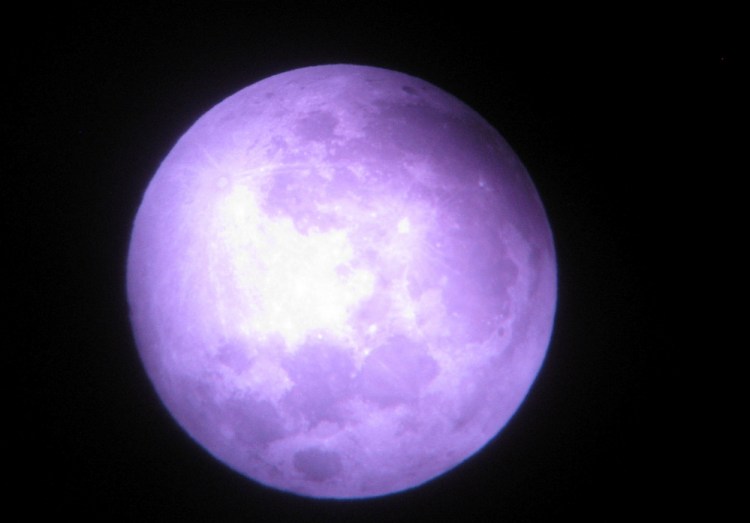Unsure whether I’d ever be awake for this event again, I placed the Earth-based 4.5-inch Newtonian reflecting telescope on the deck and aligned it to the cardinal directions, unpacked a lens filter for moonlight, hung a pair of binoculars around my neck and aimed a lawn chair strategically south two Sundays ago to watch the total lunar eclipse transpire in full, perfect view above my spruces and pines.
It was the third total lunar eclipse I’ve watched, the other two amid city lights. Last week’s was different, not only for being in the woods, but also for being decades along in my ability to make sense out of what I was seeing. The whole thing is more shadowy than ever.
Not the mechanics of the eclipse — which is what I was concentrating on the first two go-rounds. That’s pretty simple, really. The Earth is orbiting around the sun, and the moon is orbiting around the Earth (roughly once a month — you can see the ghost of the word “moon” in the word “month”). When the Earth comes directly between the sun and moon, the Earth’s shadow, or umbra, is cast on the moon. This happens only when the moon is full because that’s when the moon is directly opposite the sun. The reason there isn’t a lunar eclipse every month is that the moon’s orbit is angled about 5 degrees to the plane of the Earth’s orbit of the sun, so the Earth comes directly between the moon and sun only sometimes.
I thought hard about those motions during the other lunar eclipses, trying to place myself in a context with them. I couldn’t do it, really. The whole spherical contraption is too big and only leads to even bigger perplexities. Like, a lunar eclipse on Earth is a solar eclipse on the moon.
On the deck in the clear September evening, the full moon is so bright it actually boggles your eyes in a telescope. The more so when they’re wearing out anyway. So a filter on the lens cuts the white glare and clarifies the craters, plains and mountain shadows. Soon a fuzzy convex darkness inches onto the moon wafer. With cosmic patience you wait, look through the binoculars, get up for a closer view in the telescope. The binoculars are better because while the telescope shows the surface details, the binoculars show the whole moon suspended deep in space.
The swelling darkness turns the moon reddish, not black. The moon is still reflecting indirect light and the Earth’s atmosphere filters out the blue wavelengths, letting the reddish light through.
As the moonlight fades, the fainter stars emerge. Toward totality, I could even see the galaxy in the northeast. A few meteors streaked through, a couple of them bright. The world was a reddish-dark orb suspended over the woods.
Down on the edge of the deck, a tiny point of light appeared. What the heck is that? It shone steadily for a minute or two. When I raised the binoculars to look at it, which would have done no good whatsoever, it winked out. All I could think of was the reflection from the back of a wolf spider’s eyes. I’ve seen that before, and this glint was the right pinpoint size. But I don’t know.
In the woods, things moved around, cracking branches, like in a dream. A deer, probably. Maybe. From farther back came the wraith-like lyric of a barred owl. Now and then a glint of starlight shot through the trees from outer space — when the rotating Earth aligns a shaft through maples and hemlocks, for a fleeting instant a star with just the right angle peeks through.
Maybe by then I was only half-awake. The rusty moon was suspended among the stars like a being in a dream.
Myths about eclipses usually depict a conflict: a battle in the sky; some kind of godlike displeasure; a portent of death; a sign of imbalance. Since we in our scientific wisdom know the mechanics of eclipses, we dismiss the mythologies as childish, if forgivable, nonsense. Scientists have long assumed and even teach in books that some “primitive” cultures mistakenly believed the moon was being eaten during an eclipse.
But assuming the mythmakers believed the stories to be literal facts is as childishly mistaken about psychological reality as the stories are childishly mistaken about the scientific reality. Pomo Indians of the West Coast did not think a bear literally attacked the moon during a lunar eclipse, any more than we think the sun literally rises in the morning.
Their story of the moon and the bear conveyed, not facts of outer physical reality, but facts of inner psychic reality. In their cosmology, the difference between outer and inner was not as sharp as we assume it is. The boundaries between woods and dreams were much more shadowy to them than they are to us. You might meet a bear in the woods, or you might meet him in a dream. On an abnormal evening in September, the sky might reveal the place they intersect. “The sky is just the same as the Earth, only up above, and older,” goes a translated observation from a Micmac story.
For a little while, the rusty moon hung suspended in deep space like in a dream. The darkness overtaking the sky cast the backyard in Troy into the penumbra, at least, of some inner life. It was disturbing and I was haunted by thoughts of loved ones who these days seem lost in the woods. In reality there is a conflict, an imbalance, a heavy displeasure. It feels like a lunar eclipse.
It took a couple of long hours of patient watching for the Earth’s shadow to cover the whole wafer of white moon. Science promised it would equally slowly uncover and return to its eye-boggling brightness. Somehow, there in the owl-hooting woods, it seemed sort of uncertain, though. Would it really return?
Of course it would. But to make sure, I left the telescope standing and waited in my chair until a slip of light re-appeared on the edge of the moon.
Dana Wilde lives in Troy. He is a contributor to “Pluto: New Horizons for a Lost Horizon” available from North Atlantic Books. You can contact him at naturalist1@dwildepress.net. Backyard Naturalist appears the second and fourth Thursdays each month.
Send questions/comments to the editors.




Success. Please wait for the page to reload. If the page does not reload within 5 seconds, please refresh the page.
Enter your email and password to access comments.
Hi, to comment on stories you must . This profile is in addition to your subscription and website login.
Already have a commenting profile? .
Invalid username/password.
Please check your email to confirm and complete your registration.
Only subscribers are eligible to post comments. Please subscribe or login first for digital access. Here’s why.
Use the form below to reset your password. When you've submitted your account email, we will send an email with a reset code.